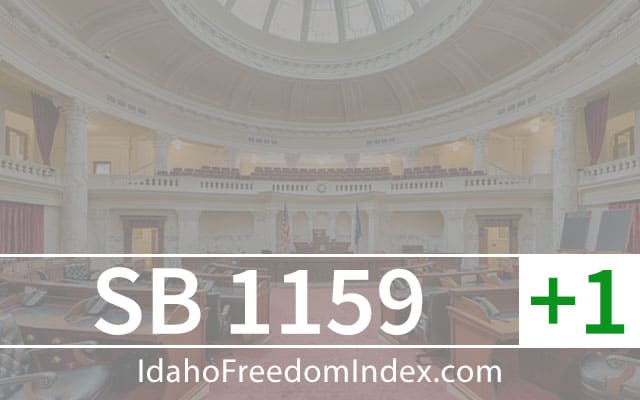


Bill description: SB 1159 would revise several procedures for the initiative process in Idaho.
Rating: +1
Does it violate the spirit or the letter of either the US Constitution or the Idaho Constitution? Examples include restrictions on speech, public assembly, the press, privacy, private property, or firearms. Conversely, does it restore or uphold the protections guaranteed in the US Constitution or the Idaho Constitution?
In 1912, Idaho voters approved an amendment to the Idaho Constitution that grants voters authority to put initiatives on the ballot. This section of the state constitution today reads as follows:
The people reserve to themselves the power to propose laws, and enact the same at the polls independent of the legislature. This power is known as the initiative, and legal voters may, under such conditions and in such manner as may be provided by acts of the legislature, initiate any desired legislation and cause the same to be submitted to the vote of the people at a general election for their approval or rejection.
A key feature of this provision is that it grants the Legislature the authority to specify how the people can put an initiative on the ballot. SB 1159 would operate within this framework.
For a historical perspective, even though the constitutional amendment passed the Legislature in 1911 and was ratified by the people in 1912, the Legislature never took action to prescribe the conditions and manner in which an initiative could be approved. As a result, “the initiative and referendum provision of the amendment to the constitution lay dormant for more than twenty years until the legislature by chap. 210 of the 1933 session enacted the provisions of that chapter, prescribing the manner and method of exercising the initiative and referendum privileges.” (Luker v. Curtis, 64 Idaho 703)
This observation was written in a 1943 state Supreme Court opinion, which decided that the Legislature did have the authority to repeal a voter-approved initiative. The opinion of the court clearly states that the people can only pass a law through the initiative process “under such conditions and in such manner as may be provided by acts of the legislature.” The Legislature has the constitutional authority to limit initiatives, or, as was the case for the two decades between the constitutional amendment and the 1933 legislative session, to render the provision dormant by taking away the procedures outlining the initiative process.
SB 1159 would increase the number of legislative districts where petitioners must gather signatures from 18 (out of 35) to 32 and would increase the percent of signatures petitioners must gather from qualified electors in each district, and statewide, from six percent to 10 percent (when the Legislature first passed the initiative procedures in 1933, the requirement was for 10 percent statewide). The bill would also reduce the length of time petitioners have to get an initiative on the ballot from 18 months to 180 days.
The changes which SB 1159 makes would uphold the principles the framers of the United States Constitution and the Idaho Constitution supported. This would be accomplished by moving us away from a direct democracy and securing the republican form of government established in the constitutions.
During the state constitutional convention, held in 1889, when a proposal was presented to do away with the state Senate, and to move entirely to a system of direct representation, every representative except one voted against the proposal. The convention rejected the idea that the state should establish a direct democracy and endorsed a republican ideal of government.
SB1159 would uphold the Idaho Constitution while protecting the republican form of government the founders of our state and the union intended. If an initiative is to get on the ballot, then petitioners would have to gather the support of a large majority of the state, with representation from both rural and urban districts.
(+1)


